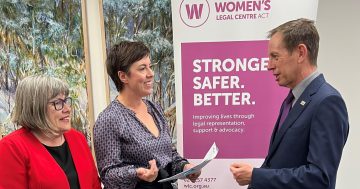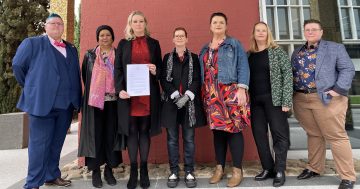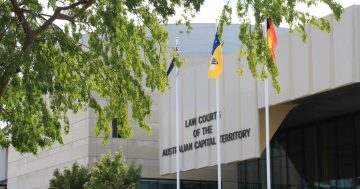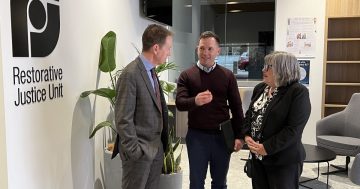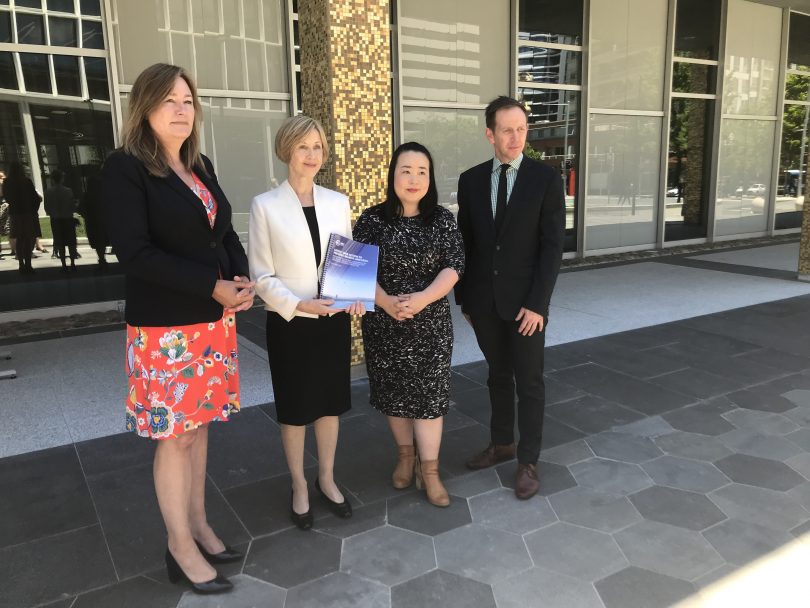
Acting Chief Minister Yvette Berry accepts the report from committee chair Renée Leon alongside Canberra Liberals Leader Elizabeth Lee, and ACT Greens Leader and Attorney-General Shane Rattenbury. Photo: Lottie Twyford.
A comprehensive report into sexual assault prevention and official and community responses to victim-survivors has recommended the Territory move to an ‘affirmative’ consent model, improve sexual and consent education in schools, increase training for frontline workers and better integrate support services for victim-survivors.
The lengthy report – Listen. Take Action to Prevent, Believe and Heal – is the product of a Steering Committee chaired by former Secretary of the Department of Human Services, Renée Leon.
The ACT Government has until next year to respond to the 24 recommendations set out in the report, which spans sectors including education, training, and legal and criminal justice system reform.
Committee chair Ms Leon said sexual assault need not be accepted as inevitable in the community.
She said the recommendations were aimed at addressing the drivers of sexual violence and ensuring victim-survivors can access the support they need.
Acting Chief Minister Yvette Berry accepted the report on behalf of the government, describing it as “making for hard-reading” and “confronting”.
“When you hear the stories of victim-survivors, when they open up warts and all, then you see that it’s worse than everyone thinks,” Ms Berry said.

Renée Leon chaired the steering committee which compiled the extensive report. Photo: Dominic Giannini.
Ms Leon said the committee had sought to engage with victim-survivors, including by examining the results of a Women’s Health Matters survey that compiled the responses of 400 victim-survivors, and personally meeting with 17 victim-survivors who were willing to have their stories shared.
Ms Leon, like the Minister, described the stories as confronting, not just because of the assault they’d experienced: “It’s the re-traumatising effect of them trying to get the support they need.”
One victim-survivor said, “the hardest part ended up not being the rape, but the way the system responded”.
Several recommendations called for increased collaboration between support services to ensure victim-survivors are supported as they engage with multiple agencies and sectors over a long period of time.
Increasing and improving training to frontline workers in health, education, childcare and housing, and community and cultural leaders so they can be better equipped to respond to sexual violence disclosures was also recommended.
Other recommendations called for culturally appropriate training and education for the Territory’s Aboriginal and Torres Strait Islander community. Training and education for other diverse groups such as the LGBTIQ+ community was also recommended.
The committee also said the government should establish an ongoing, structured consultation program with victim-survivors so their stories can continue to be shared.
One recommendation was that the ACT considers implementing an ‘affirmative’ or active consent model, as previously suggested by Labor backbencher Dr Marisa Paterson.
“It should not be enough to assume consent from silence or a ‘freeze’ response. Law reform and community education must ensure there is active consent before and during any sexual activity,” the report read.
The report also calls for other legal changes and community education measures that begin in schools.
In light of the recent Jenkins report into workplace culture at Parliament House, several workplace reforms were recommended.
These included a need to review existing enterprise bargaining agreements to ensure workplaces can better respond to allegations of sexual harassment and assault implement the Respect@Work recommendations as detailed by the Australian Human Rights Commission.
It also said WorkSafeACT should have the power to regulate the prevention of and responses to sexual harassment and assault in ACT workplaces.
Another broad swathe of recommendations related to the criminal justice system, such as a need to review all sexual assault cases reported to ACT Policing but not progressed to a charge. Better data collection was also recommended.
In 2020, less than 3 per cent of sexual offences reported to ACT Policing resulted in charges being laid against the offender. The report noted the number of offences reported to police is already underreported.
It was also recommended that the government research additional measures to improve victim survivors’ experience of the criminal justice system and improve education in space.
The ACT Government will hand down its full response to the report, including an outline of actions to be taken, in the New Year. It’s expected the recommendations could take up to a decade to all be implemented, with some, like cultural change or consent education reform to be ongoing.
If you or someone you know is impacted by sexual assault, domestic or family violence, call 1800RESPECT (1800 737 732) or visit www.1800RESPECT.org.au.
DVCS’s free service can be reached 24/7 on 6280 0900, via SMS on 0421 268 492, through email at crisis@dvcs.org.au or on their website dvcs.org.au. In an emergency, call triple-zero (000).












